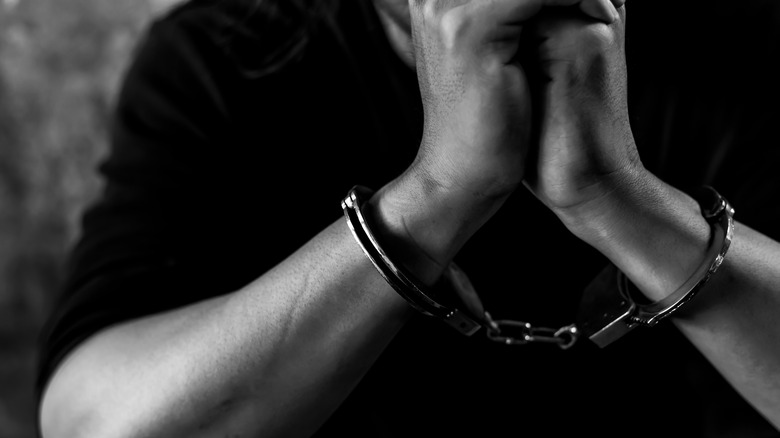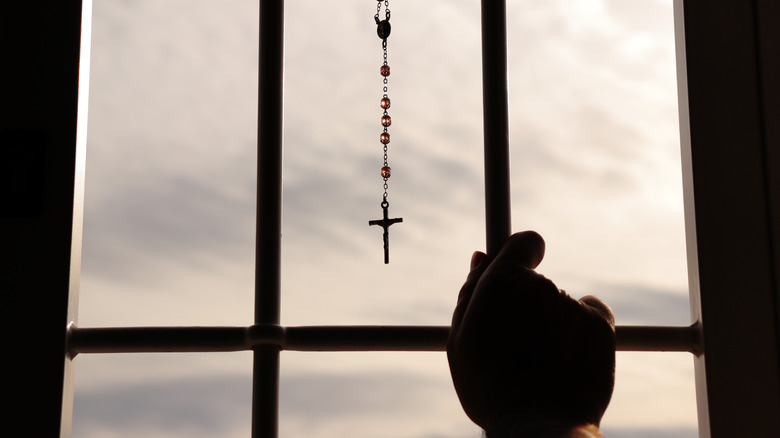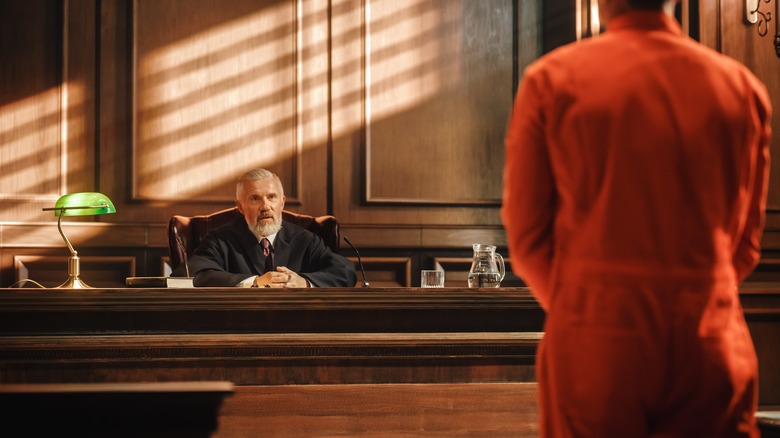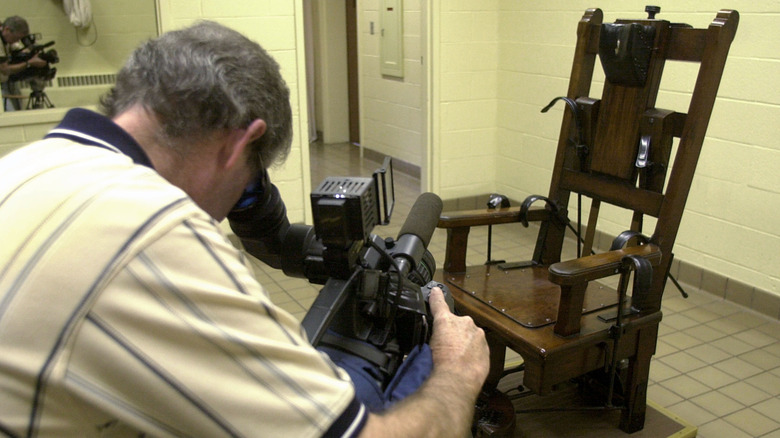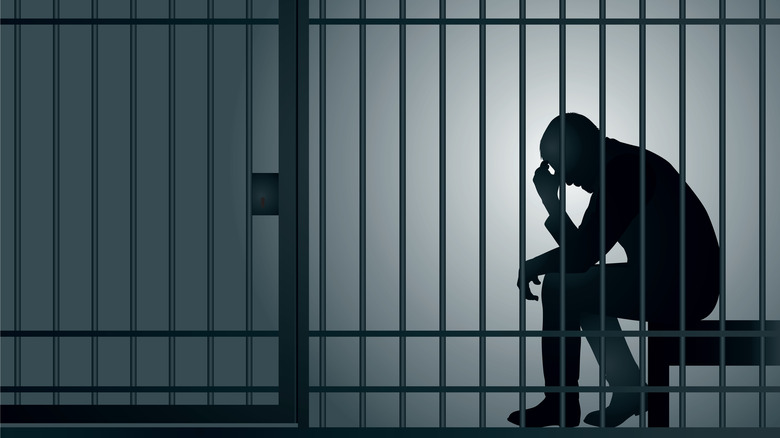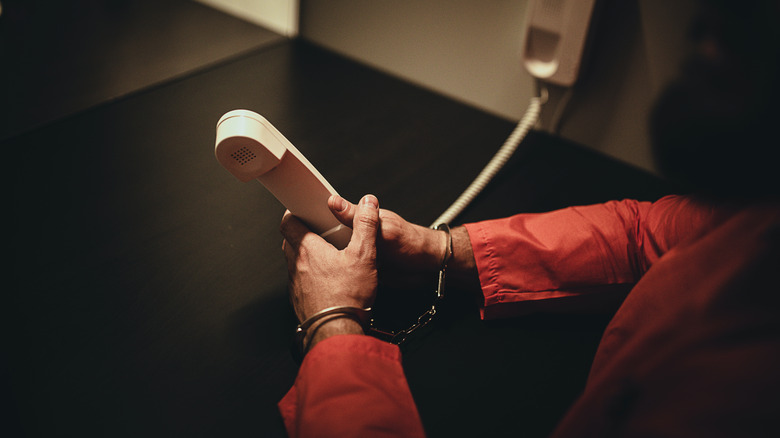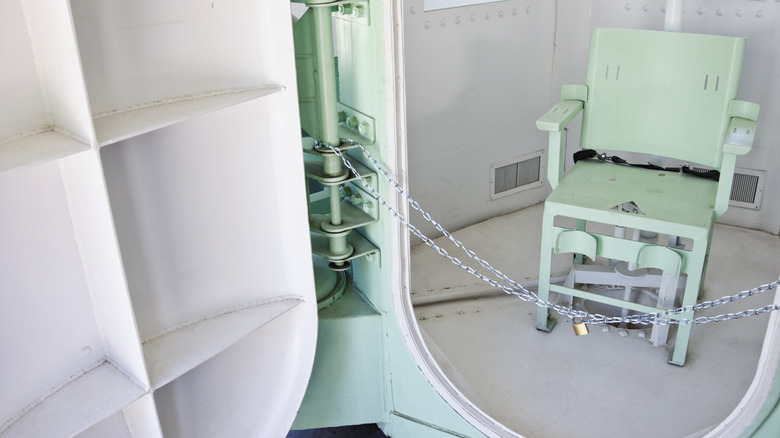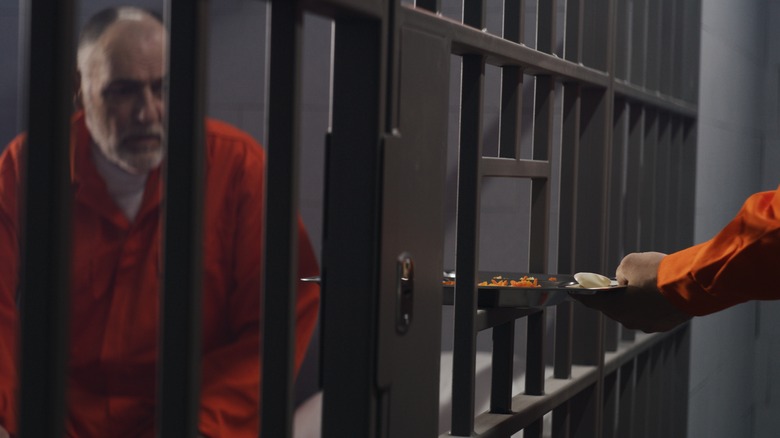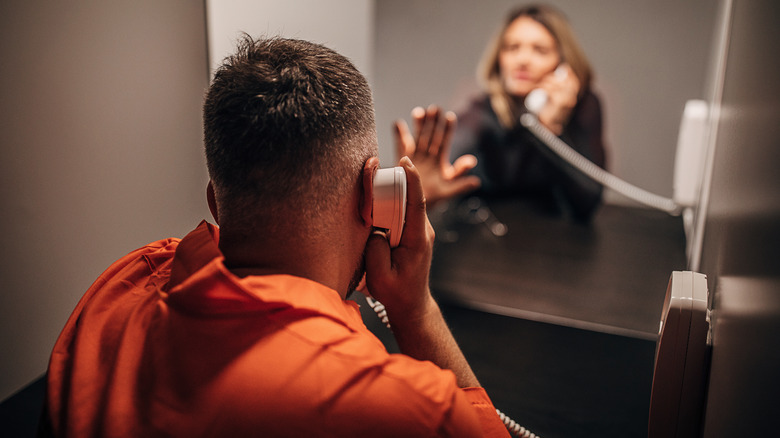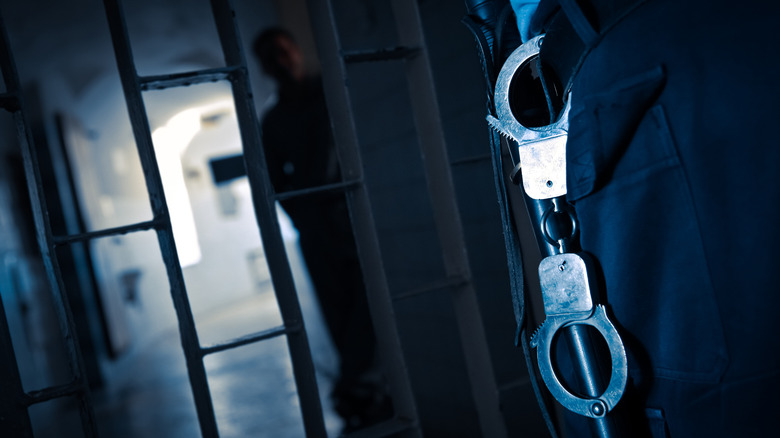What The Final Days Of A Death Row Inmate Are Like
It doesn't matter what side of the capital punishment argument a person falls on, some conversations are universally important to have. That includes what it's really like for those who have gotten a date for their execution. Before that conversation, though, there are a few important things worth noting — like the fact that for many people, execution comes only after years behind bars and oftentimes, in solitary confinement.
In 2020, the average time a death row prisoner could expect to wait for their execution date was around 18 years, according to the United States Department of Justice. That's brought up a debate over whether or not the process leading up to the death penalty is cruel and unusual ... and while it's important, it's a whole other can of worms that provides an important context here.
It's also worth mentioning that exactly what happens in the weeks and days before an execution can vary quite a bit. Robert Dunham is the executive director of the Death Penalty Information Center, and he told The Marshall Project, "There are certain things states are constitutionally required to do. You can't execute someone in a manner that is cruel and unusual. But everything else is up [to the states] to decide."
Inmates may choose spiritual guidance
Precise laws guiding the roles that spiritual advisors take in the final days of a death row inmate vary, but there are some broad similarities. In many states, spiritual advisors meet with the condemned in the days leading up to their execution, and some have written about their experiences.
In a piece for the United States Conference of Catholic Bishops, Joseph Ross wrote about ministering to an inmate named Jerry Bivins. Ross wrote that Bivins — who had converted to Catholicism in prison — "was his own, genuine self. We laughed, we spoke about his family and his sorrows ... and mostly prayed. ... We read and re-read Jesus' promise ... 'Today you will be with me in Paradise.'" Ross was allowed to stay with him until the hour before execution.
Rev. Jim Brazzll has also written about his role (via Frontline), saying it varies by inmate. Some find comfort in spiritualism or faith, some want to talk about something absolutely mundane, and others write messages, sing, or even tell jokes. He explained his job: "You go in and you try to make their last days, their last hours, just as comfortable as possible."
Even atheists might want someone to talk to. The New York Times looked at the case of Phillip Hancock, who was raised Methodist and decided there was nothing to it at all after ending up on death row for a drug-related killing. His final days were spent with atheist chaplain Devin Moss, discussing nonexistence, morality, and the responsibility of people to help people.
Sometimes, last minute appeals happen
Even though death row inmates have their executions scheduled, in those final days they can have their legal counsel successfully argue for a delay. And it can happen a lot: In 2024, the Supreme Court agreed to hear the widely publicized case of Richard Glossip after his execution was delayed the previous May. Shockingly, he'd had nine execution dates set, and three times he'd eaten his last meal.
It's not often that a death row case will go all the way to the U.S. Supreme Court, but there's another rather last-minute option, too: Executive clemency. In 2005, California officials oversaw the controversial execution of Stanley Williams, the Crips-founder-turned-childrens'-author who was convicted of several murders ... and was later nominated for the Nobel Peace Prize. Among the last-minute attempts to overturn his sentence was an appeal to Gov. Arnold Schwarzenegger.
Williams would ultimately be executed on December 13, but just a few days prior — on December 8 — Schwarzenegger presided over a clemency hearing. The governor's office didn't issue their verdict until the day before the execution. They quashed last-minute hopes with a simple statement (via NPR): "The facts do not justify overturning the jury's verdict or the decisions of the courts in this case."
Inmates are placed on suicide watch
Like many of the regularly scheduled events that lead up to a death row execution, this one can vary quite a bit. Let's take the State of Oregon as a baseline: There, death row inmates get their execution date about 45 days in advance, but it's only in the last two days that the inmate is transferred to a cell in Special Management Housing, which is a space close to the death chamber. There, it's protocol to place inmates under "death watch."
Slate editor Andy Bowers explained to NPR that different prisons have different guidelines, and in most death row cases, an inmate can expect to be put on suicide watch anywhere from a few days to a few hours before execution. In most cases, cells feature 24-hour surveillance and random (and frequent) in-person checks from guards or even fellow inmates. Surprising? Bowers says that studies have found that other prisoners are better at the job than guards.
Situations also vary based on risk assessment. Those deemed at high risk of suicide attempts might have around-the-clock monitoring and may even be denied clothing in favor of paper gowns. "An observation room might have little more than a mattress on the floor," Bowers explained. "Any stray bits of fabric could be used as a noose." That's not to say it's a foolproof system: In 2006, one death row inmate died by suicide 15 hours before he was scheduled for lethal injection, and in between checks with intervals of 15 minutes.
Witnesses are selected, with input from inmates
State laws say that executions need to be witnessed. Let's look at Oregon's specifics: At any given execution, there's going to be witnesses including five people representing the media, at least one doctor, and the attorney general. The person being executed can also ask that certain people be present, and they're chosen in the days leading up to the execution. In North Carolina, for example, they're named about a week in advance.
Although it varies by state, that's the gist of things — but it's also worth mentioning it's not a requirement that the person choose witnesses, but when suitable witnesses (that, for example, meet the criteria of being over 18 years old) are opposed by the state, that usually means it's a case that's going to end up in court.
When that happens, it can lead to delays. Leon Vincent Taylor was executed in 2014, after being convicted of killing a gas station attendant in front of his 8-year-old stepdaughter. Among the witnesses Taylor chose was his half-brother, Willie Owens. Standard, but Owens had participated in the robbery. Putting him among the victim's family members to view the execution would be understandably problematic, but after a short delay it was ruled that Taylor's right to choose witnesses was paramount. Owens was granted permission but declined.
Detailed logs are kept
Many states that carry out executions keep detailed logs of the final days and weeks of inmates, and in 2006, the Associated Press asked for, received, and reviewed Ohio's logs (via NBC News). They're proof that despite the legal framework each inmate exists in, there are still widely varied ways in which they can fill some of their final hours.
For many, it's the question of remorse that looms the largest: While some refuse to take ownership of the crimes they were convicted of, others continue to blame the victims and still others express remorse over the actions that led them to death row. Others joke about it — when Adremy Dennis is asked what he needs, he replies, "A chopper out of here."
But other ways of filling those final hours are as varied as those who find themselves counting down the minutes. Some watch television, others opt for music, and others request books. Some write letters, some ask for all the soda and pie they can stomach, while others focus on appeals that might push back their executions. Many pray, some cry, and perhaps most surprisingly, many laugh, joke, and swap stories with the guards and anyone who might happen to come visit them. Some even exchange gifts: Richard Fox went to his execution with a small wooden cross, a gift from one of the guards.
Some inmates spend their last days using their phone calls
Instead of just saying that many death row inmates spend their final days reaching out to the outside world, let's talk about some examples. Kenneth Eugene Smith was sentenced to death for the 1988 killing of a pastor's wife, and before dying by the experimental and highly controversial method of nitrogen hypoxia in 2024 — or suffocation — his own pastor, John Ewell, talked to the Daily Mail about his last days. His last phone call? To his wife, Deanna Smith.
Reaching out to family is pretty logical, but there's also cases like that of Arnold Prieto. He died by lethal injection in 2015, sentenced for the 1993 murders of three San Antonio senior citizens. One of his final phone calls was to Patrick Chappatte, who was curating an exhibit that included his artwork. Chappatte told The New York Times it was "the most difficult phone call of my life," and said that Prieto explained — in between interruptions from the guards, who were insisting there would be no last-minute interviews — that he felt "my drawings speak for me. They'll be here when I'm no more."
Records of Ohio's death row detail the final days of John Hicks, including his repeated attempts to call his mother. Hicks was facing execution after being convicted of killing his mother-in-law and his 5-year-old stepdaughter, and records show many attempts at getting through to his mother. When he finally did, they spoke for just four minutes.
There's always hope for a last-minute reprieve
Some states — like Oklahoma — allow inmates to make final appearances in front of parole and clemency boards in the weeks before their execution dates. It's worth noting that sometimes, that phone call does come through.
Take Oklahoma's Richard Glossip. He was on death row after being convicted of hiring someone else to kill his former boss, who was beaten to death in 1997. Fast forward to 2023 — through the setting of a whopping nine execution dates — and Glossip was partway through what he believed was going to be his last visit with his wife when he was pulled aside and told he'd gotten another delay. Glossip has long maintained his innocence and told CNN, "I want to continue to fight. I want to continue to get my message out to people." (As of January 2024, his case is heading to the Supreme Court.)
Julius Jones, also of Oklahoma, had his execution halted (and sentence commuted to life in prison) about four hours before it was due to be carried out. Texas' William Keith Speer was spared four hours before his execution in 2023, and in 2014, Russell Buckley's execution was delayed over concerns that his medical condition would interfere with the execution. (He was ultimately executed in 2019.) In 2015, federal courts argued over whether or not these last-minute, seemingly arbitrarily decided reprieves were cruel and unusual punishment. The initial ruling was that it was, and California's procedures were ruled unconstitutional. (That ruling was later overturned.)
Inmates are monitored for physical and mental competency
In 1986, the Supreme Court set a major precedent with Ford v. Wainwright, when they declared it unconstitutional to execute an inmate who wasn't capable of understanding what was going on. That's made pre-execution exams a crucial set in preparation for escorting an inmate into their final days.
Examinations involve physical and mental checkups, and according to the National Commission on Correctional Healthcare, exams and evaluations need to be carried out by those outside of the correctional system. Still, there's a catch. They also note that as of the 2022 statement reaffirmation, there are no concrete criteria put in place at a federal level, and it's up to states to have medical and psychiatric professionals on hand to monitor inmates in the days leading up to an execution and give the go-ahead.
Suzanne Craig Robertson is a member of the Tennessee Bar Association and author of "He Called Me Sister: A True Story of Finding Humanity on Death Row." The book chronicles her 15-year correspondence with Cecil Johnson, ending with his 2009 execution. When she met him before his execution, their visit was interrupted by a nurse who took his temperature. She wrote (via Salon): "'They want to make sure I'm well,' Cecil said. 'That's funny.' We all laughed with him, a little more forced this time, realizing that the State cared only about his health because it would mean fewer complications when it came time to kill him."
Last meals are requested and eaten
The practice of serving condemned inmates a last meal of their choosing is a pretty famous part of death row, but as of 2011, Texas no longer offers inmates that opportunity. Why? When Lawrence Russell Brewer was facing execution for the brutal murder of James Byrd Jr., he first ordered a massive last meal that he then refused, saying he wasn't hungry. That, in turn, led to Sen. John Whitmire saying (via the BBC), "Enough is enough. It is extremely inappropriate to give a person sentenced to death such a privilege."
Other states still offer last meals, but exactly what can be requested and what gets served varies by state. Typically, inmates are expected to submit their orders about two days prior to their execution, and in most cases, they'll get a version that's made with whatever the prison kitchen has on hand, or what can be bought locally.
Some states have monetary limits on what inmates can ask for, and interestingly, inmates also have the option of requesting that their last meal remain confidential — surprising, considering the public's obsession with it. In 2020, Henry Hargreaves released a book of photos recreating famous last meals and explained to The New York Times, "The detail of death-row meals brought home the human aspect. I thought, if I can empathize with these people through their last meals, other people can, too."
Inmates are usually allowed final visits
Most of the time, it's impossible to know if a "goodbye" is going to be the last, but when it's said on death row, it's a pretty certain thing. In the final days of a death row inmate's sentence, they're often allowed visitors who come to say goodbye, give final thoughts and wishes, and in the case of atheist chaplain Devin Moss, ponder meaning without God.
Visitors are as varied as the men and women who are on death row. Ohio logbooks (via NBC News) record Scott Mink — sentenced for the murder of his parents — being visited by family members, who tell him to forgive himself. Also visited by family? Richard Glossip, during the run-up to his ninth execution date.
John Glenn Roe took pictures with visiting relatives, and Stephen Vrabel, condemned for the murder of his girlfriend and his 3-year-old daughter, assured his family: "This must be very harder on my family than it is on me because I am ready to go."
The view from the other side
It's also worth taking a quick look at those final days from the other side: Before an execution — and as accurately depicted in Stephen King's "The Green Mile" — execution teams stage practice runs before they have to do the real thing. NPR spoke with officer Catarino Escobar, who often played the part of the condemned inmate in trial runs. He was often fine, he said, until the moment he was strapped into the gas chamber.
"I wasn't acting or playing," he explained, saying that as far as his fight-or-flight responses were concerned, "I believed that I was being executed." After conducting sprawling, nationwide interviews of professionals in all different areas of death penalty enforcement, the outlet found that not one of them actually supported capital punishment for an interesting reason: They knew how hard those weeks, days, and last moments were on literally everyone involved.
It was perhaps San Quentin State Prison Warden Jeanne Woodford who summed it up best, saying, "People think that it would be so easy to go up and execute someone who had committed such heinous acts." But in the days between receiving the execution notice and the execution itself? "You just don't know what to say to people who are in so much pain."
